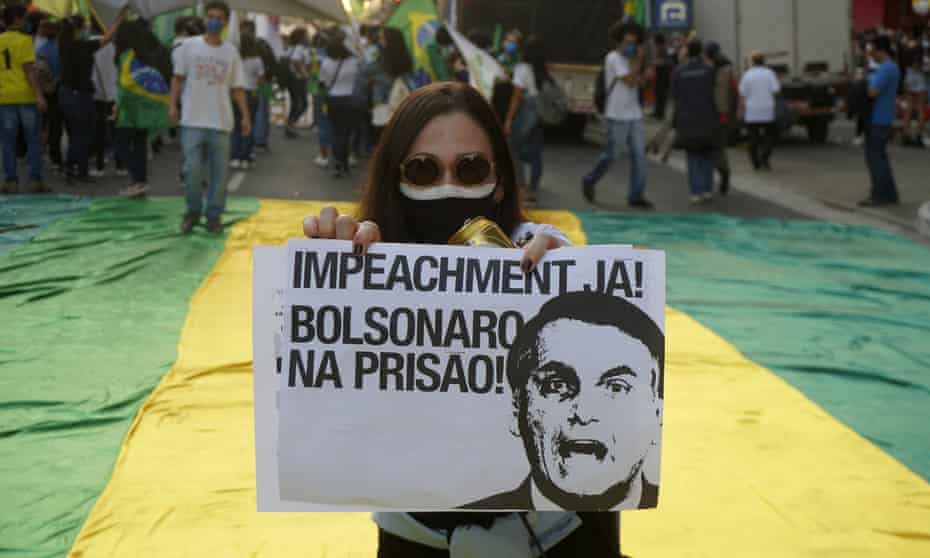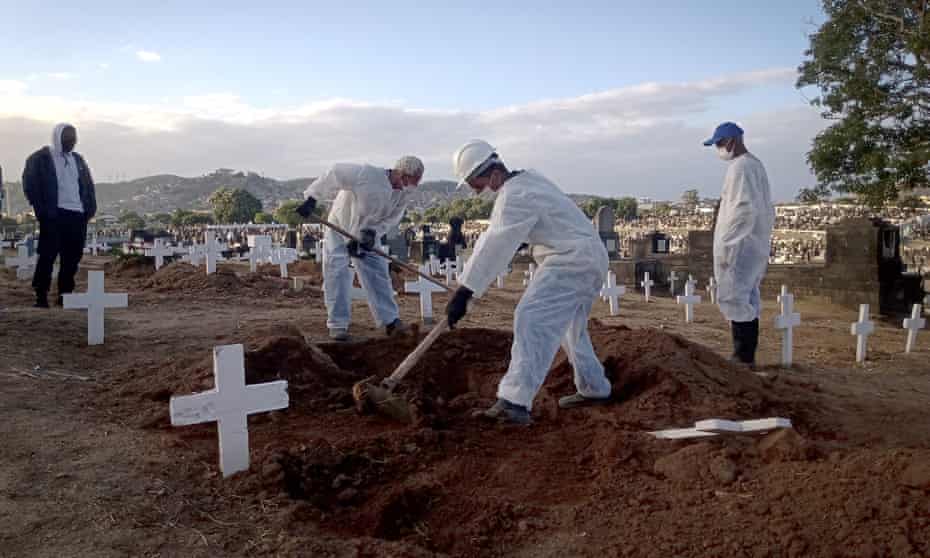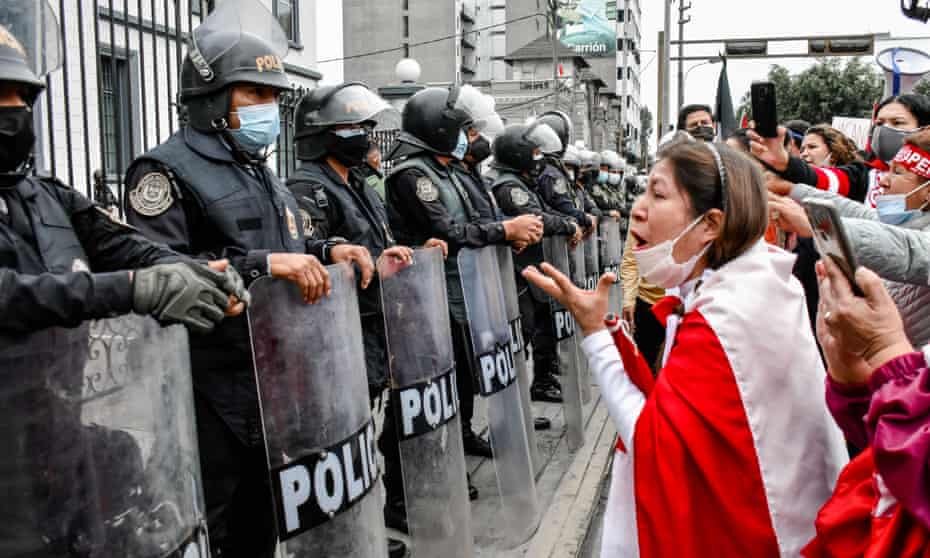‘New wave of volatility’: Covid stirs up grievances in Latin America
A new series on Covid’s global political impact starts by looking at how the pandemic has fuelled turbulence in Latin America and the Caribbean

People take part in a protest against the Brazilian president Jair Bolsonaro’s handling of the Covid pandemic in São Paulo.
Photograph: Anadolu Agency/Getty Images
Covid: the global political impact
by Tom Phillips in Fortaleza, Ed Augustin in Havana and Dan Collyns in Lima
Fri 6 Aug 2021
For Filipe da Silva, hitting the streets was about staying alive.
“Unfortunately, Brazil elected a murderer,” the 28-year-old declared as he and thousands of fellow protesters streamed through the seaside city of Fortaleza last month to decry the president’s bungling of a Covid epidemic that has killed more than half a million people.
For Eduardo Ramos, joining the largest protests in Cuba’s post-revolution history was about demanding political freedom and voicing anger at the hardships created by the pandemic.
“Millions of people like me have lost their youth,” complained the 18-year-old Cuban, who scrapes by hawking avocados and mangoes after Covid robbed him of his $20-a-week (£14) job collecting bus fares.
Silva and Ramos were marching against systems of different stripes: Jair Bolsonaro’s far-right administration in Brazil and the communist dictatorship of Cuba.
But both are expressions of what many suspect is a new wave of Covid-fuelled social and political turbulence that is starting to sweep the region in response to the ravages of a pandemic that has officially killed nearly 1.4 million people in Latin America and the Caribbean.
“People are pissed and they don’t have a lot of options,” said Christopher Sabatini, a senior fellow for Latin America at the Chatham House thinktank. “As people’s quality of life deteriorates, political stability also deteriorates.”
Sylvia Colombo, a Brazilian correspondent who covers the region from Argentina for the Folha de São Paulo newspaper, said she was steeling herself for “transformations and new tensions” in the coming months.

Funeral workers carry out burials of Covid victims at Inhaúma cemetery in Rio de Janeiro. Photograph: Anadolu Agency/Getty Images
During last year’s lockdown in Buenos Aires, Colombo wrote a book about the atypical upheaval that had gripped the region on the eve of the pandemic, from Venezuela and Bolivia to Chile. She called 2019 Latin America’s “year of wrath”.
Covid, which first struck Latin America in February 2020, largely smothered that indignation, as countries went into shutdown and protesters into retreat. But now it is back, with demonstrations also erupting in Paraguay, Guatemala and Colombia, where at least 44 protesters have been killed since the start of unrest in April.
“Everything suggests there’s going to be a new wave [of volatility]. We’re already seeing some ripples,” said Colombo, who believed Covid had exposed “Latin America’s pre-existing conditions” – including weak health and welfare systems, profound inequality and a huge and vulnerable informal workforce.
“If on one hand the pandemic forced people off the streets, on other hand it exacerbated all of these problems,” Colombo said of a region that has 8.4% of the global population but has suffered 32% of Covid deaths.
So far the most unexpected convulsion has come in Cuba, where thousands took to the streets on 11 July for what were the most widespread protests since Fidel Castro’s 1959 revolution. The dissenters, who mobilised in every city and every province, had a mishmash of grievances, including the lack of political freedoms under one-party rule. But many were in part driven by the human impact of Cuba’s worst economic slump since the early 1990s, when the disintegration of the Soviet Union plunged it into a “special period” of hunger and deprivation.
When Cuba confirmed its first coronavirus cases in March last year, the Caribbean island was already reeling from Donald Trump’s decision to reverse Barack Obama’s easing of the trade embargo and ratchet up sanctions. Coupled with Covid, which has decimated the local tourism industry, those supercharged sanctions caused the economy to contract 11% last year and have cost the state billions of dollars of annual revenue. The fall in imports created by this cash crunch has led to realities unimaginable a few years ago: last weekend Ramos spent five hours queueing for two packs of hotdogs. Queueing for hours or even days is now part of life for millions of Cubans. “Things were better before because food wasn’t scarce, and the queues weren’t like this,” Ramos said.
In Brazil, there is also widespread anger over the Covid-battered economy, the estimated 8m jobs lost during the pandemic and the resurgence of hunger. “This is a humanitarian crisis,” said Júlio Lancellotti, a Catholic priest who has been battling to feed malnourished citizens on the streets of the country’s richest city, São Paulo.
Public indignation has been amplified by the scale of the death toll, second only to that of the US, allegations of vaccine-related corruption, and the denialist response of a president who has refused to be vaccinated and called coronavirus a “little flu”.
“He’s indecent. He’s immoral. He is incompatible with civilisation. He is an outrage,” seethed Alfredo Marques, a 62-year-old lawyer who joined the recent anti-Bolsonaro rally in Fortaleza, ripping off his face mask to lambast his country’s far-right leader.
It remains unclear what, if any, the long-term political consequences of this fledgling outbreak of dissent will be.
Hundreds of Cuban objectors have reportedly been detained, as the government battles to prevent repeat protests and retain control. In Brazil, Bolsonaro’s ratings have plummeted and hundreds of thousands have repeatedly taken to the streets since late May. But the country is not due to choose its next leader until October 2022, by which time the political and economic landscape may have shifted dramatically.
The pandemic’s most tangible political impact has come in Peru, which has been deeply traumatised by coronavirus and has suffered by far the world’s highest recorded death rate per capita.
The epidemic compounded an already profound political crisis in Peru and fuelled a dramatic increase of poverty as a strict lockdown made millions jobless, forcing thousands in the coastal capital to migrate, some by foot, to their home towns and villages in the Andes and Amazon. As Covid ravaged the country, claiming nearly 200,000 lives, some citizens were forced to buy overpriced oxygen tanks for suffocating relatives as the chronically underfunded health system, worsened by corruption, was swamped.
As elections approached this year, grief-stricken and angry Peruvians disappointed by their incumbent centrist leaders opted, sometimes out of desperation, for candidates with more extreme, anti-systemic messages, in a fragmented political field. In June, Pedro Castillo, a leftist teacher who had never held public office, was elected president – a political earthquake many suspect would not have occurred without Covid.
During last year’s lockdown in Buenos Aires, Colombo wrote a book about the atypical upheaval that had gripped the region on the eve of the pandemic, from Venezuela and Bolivia to Chile. She called 2019 Latin America’s “year of wrath”.
Covid, which first struck Latin America in February 2020, largely smothered that indignation, as countries went into shutdown and protesters into retreat. But now it is back, with demonstrations also erupting in Paraguay, Guatemala and Colombia, where at least 44 protesters have been killed since the start of unrest in April.
“Everything suggests there’s going to be a new wave [of volatility]. We’re already seeing some ripples,” said Colombo, who believed Covid had exposed “Latin America’s pre-existing conditions” – including weak health and welfare systems, profound inequality and a huge and vulnerable informal workforce.
“If on one hand the pandemic forced people off the streets, on other hand it exacerbated all of these problems,” Colombo said of a region that has 8.4% of the global population but has suffered 32% of Covid deaths.
So far the most unexpected convulsion has come in Cuba, where thousands took to the streets on 11 July for what were the most widespread protests since Fidel Castro’s 1959 revolution. The dissenters, who mobilised in every city and every province, had a mishmash of grievances, including the lack of political freedoms under one-party rule. But many were in part driven by the human impact of Cuba’s worst economic slump since the early 1990s, when the disintegration of the Soviet Union plunged it into a “special period” of hunger and deprivation.
When Cuba confirmed its first coronavirus cases in March last year, the Caribbean island was already reeling from Donald Trump’s decision to reverse Barack Obama’s easing of the trade embargo and ratchet up sanctions. Coupled with Covid, which has decimated the local tourism industry, those supercharged sanctions caused the economy to contract 11% last year and have cost the state billions of dollars of annual revenue. The fall in imports created by this cash crunch has led to realities unimaginable a few years ago: last weekend Ramos spent five hours queueing for two packs of hotdogs. Queueing for hours or even days is now part of life for millions of Cubans. “Things were better before because food wasn’t scarce, and the queues weren’t like this,” Ramos said.
In Brazil, there is also widespread anger over the Covid-battered economy, the estimated 8m jobs lost during the pandemic and the resurgence of hunger. “This is a humanitarian crisis,” said Júlio Lancellotti, a Catholic priest who has been battling to feed malnourished citizens on the streets of the country’s richest city, São Paulo.
Public indignation has been amplified by the scale of the death toll, second only to that of the US, allegations of vaccine-related corruption, and the denialist response of a president who has refused to be vaccinated and called coronavirus a “little flu”.
“He’s indecent. He’s immoral. He is incompatible with civilisation. He is an outrage,” seethed Alfredo Marques, a 62-year-old lawyer who joined the recent anti-Bolsonaro rally in Fortaleza, ripping off his face mask to lambast his country’s far-right leader.
It remains unclear what, if any, the long-term political consequences of this fledgling outbreak of dissent will be.
Hundreds of Cuban objectors have reportedly been detained, as the government battles to prevent repeat protests and retain control. In Brazil, Bolsonaro’s ratings have plummeted and hundreds of thousands have repeatedly taken to the streets since late May. But the country is not due to choose its next leader until October 2022, by which time the political and economic landscape may have shifted dramatically.
The pandemic’s most tangible political impact has come in Peru, which has been deeply traumatised by coronavirus and has suffered by far the world’s highest recorded death rate per capita.
The epidemic compounded an already profound political crisis in Peru and fuelled a dramatic increase of poverty as a strict lockdown made millions jobless, forcing thousands in the coastal capital to migrate, some by foot, to their home towns and villages in the Andes and Amazon. As Covid ravaged the country, claiming nearly 200,000 lives, some citizens were forced to buy overpriced oxygen tanks for suffocating relatives as the chronically underfunded health system, worsened by corruption, was swamped.
As elections approached this year, grief-stricken and angry Peruvians disappointed by their incumbent centrist leaders opted, sometimes out of desperation, for candidates with more extreme, anti-systemic messages, in a fragmented political field. In June, Pedro Castillo, a leftist teacher who had never held public office, was elected president – a political earthquake many suspect would not have occurred without Covid.

Protesters in Lima, Peru, demonstrate against the election of Pedro Castillo. Photograph: Kevin Limbher Vega Tinta/Medialys Images/Rex/Shutterstock
“All the [past] presidents made promises and in the end they just got rich themselves and they took Peru’s wealth to sell it to other countries,” said Elizabeth Altamirano Campos, one of the rural voters who helped catapult Castillo into office.
Javier Torres, the editor of Noticias Ser news website, said the pandemic had aggravated Peru’s underlying political crisis and deep inequality, paving the way for the shock election
“Castillo is a product of that,” Torres said, adding that the far right could also easily have prevailed as voters rebelled. “The pitch we’ve been playing on is not fit for purpose any more,” Torres said. “People are looking for something different – on the extremes.”
Filipe da Silva, an artist and LGBTQ+ activist from Brazil’s Unified Black Movement, said he was unsure what his country’s future held. He worried the “complicity” of many congresspeople meant the main demand of protesters – Bolsonaro’s impeachment – was far from guaranteed.
But as protesters across Latin America geared up for their next mobilisation, the civil rights activist vowed to stay on the streets battling a health emergency that has disproportionately affected black Brazilians.
“We’ve lost so many people. It’s heartbreaking,” Silva said. “This project of death must be stopped.”
“All the [past] presidents made promises and in the end they just got rich themselves and they took Peru’s wealth to sell it to other countries,” said Elizabeth Altamirano Campos, one of the rural voters who helped catapult Castillo into office.
Javier Torres, the editor of Noticias Ser news website, said the pandemic had aggravated Peru’s underlying political crisis and deep inequality, paving the way for the shock election
“Castillo is a product of that,” Torres said, adding that the far right could also easily have prevailed as voters rebelled. “The pitch we’ve been playing on is not fit for purpose any more,” Torres said. “People are looking for something different – on the extremes.”
Filipe da Silva, an artist and LGBTQ+ activist from Brazil’s Unified Black Movement, said he was unsure what his country’s future held. He worried the “complicity” of many congresspeople meant the main demand of protesters – Bolsonaro’s impeachment – was far from guaranteed.
But as protesters across Latin America geared up for their next mobilisation, the civil rights activist vowed to stay on the streets battling a health emergency that has disproportionately affected black Brazilians.
“We’ve lost so many people. It’s heartbreaking,” Silva said. “This project of death must be stopped.”
No comments:
Post a Comment